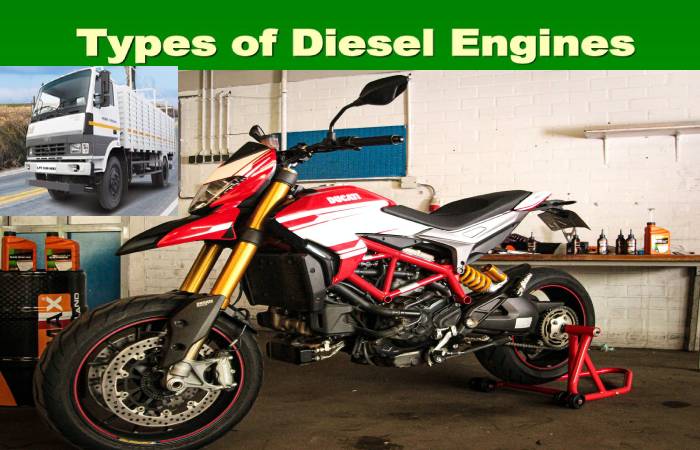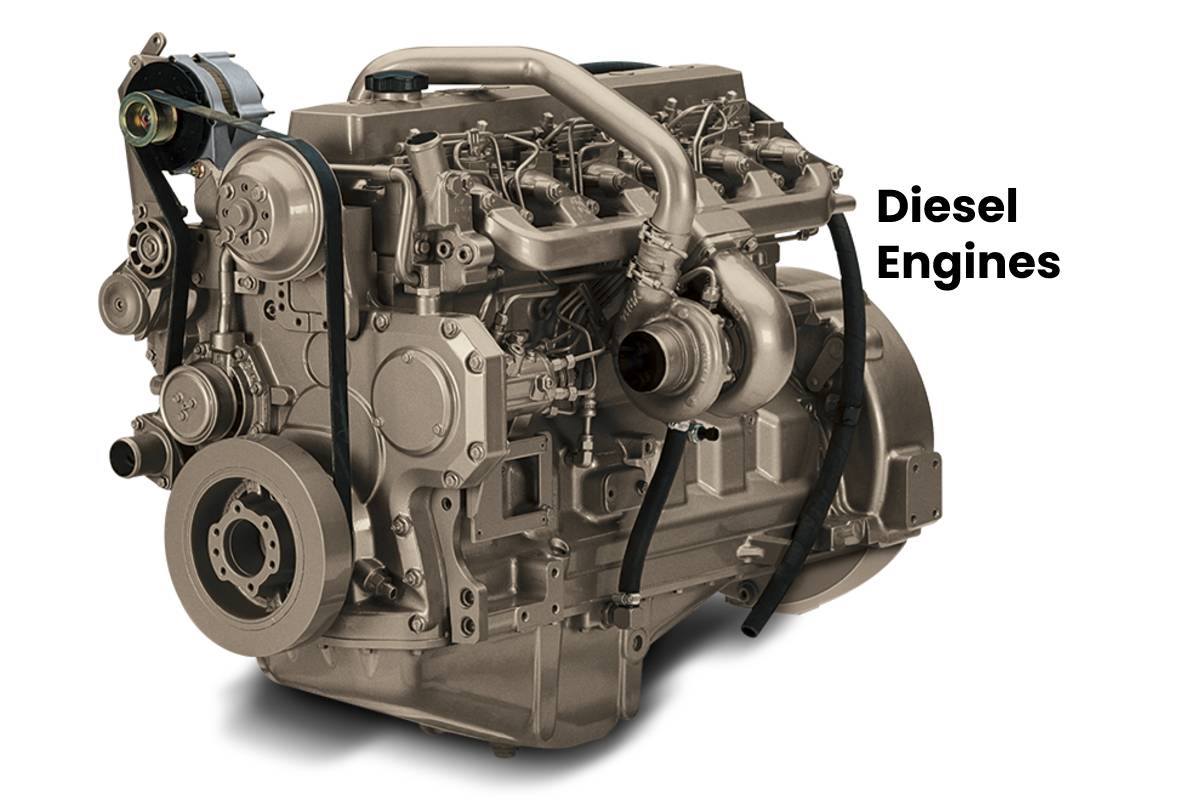Table of Contents
Diesel Engines Definition
Diesel engines, any internal combustion engine in which air is compressed to a sufficiently high temperature, ignite diesel fuel injected into the cylinder, where combustion and expansion actuate a piston.
It converts the chemical energy stored in the fuel into mechanical energy, which can use to power freight trucks, large tractors, locomotives, and marine vessels.
A limited number of automobiles also diesel-power, as are some electric-power generator sets.
How does Diesel Engines Work?
- Diesel engines create utilizing an electrical system that begins the compression ignition cycle.
- However, when the weather is cold, it is more difficult to start because of the difficulty of reaching a temperature high enough to ignite the fuel.
- Therefore, manufacturers place glow plugs, or what is known as heaters.
- A diesel engine works by igniting (igniting) the fuel. This injects sprayed and under high pressure into a combustion chamber (or pre-chamber, in the case of indirect injection) containing air at a temperature higher than the self-combustion temperature.
- In the auto-ignition process, no spark produce as in gasoline engines.
- The second step in the cycle is compression. The fuel is injected into the upper part of the combustion chamber under high pressure from the injectors so that it is atomized and mixed with the air at high temperature (between 700 and 900 ° C) and high pressure.
- Combustion causes the gas in the chamber to expand, driving the piston. This expansion, unlike the gasoline engine, generates a rectilinear motion.
- The connecting rod transmits this movement of the piston to the crankshaft, which it rotates, transforming the rectilinear motion into a rotational direction.
- The last phase of the combustion process in diesel engines is the exhaust. On the upward movement of the piston, the exhaust valve opens, and the burnt gas expel.
- If you want to be even clearer, you can watch this video that explains how these types of engines work.
Major Types Of Diesel Engines

1.Three basic size groups
- There are three basic-sized diesel engines based on power—small, medium, and large. The small engines have power-output values of less than 188 kilowatts or 252 horsepower.
- This is the most commonly produced diesel engine type. These engines use in automobiles, light trucks, some agricultural and construction applications, small stationary electrical-power generators (such as those on pleasure craft), and mechanical drives.
- They are typically direct-injection, in-line, four- or six-cylinder engines. Many turbocharge with aftercoolers.
- Medium engines have power capacities ranging from 188 to 750 kilowatts, or 252 to 1,006 horsepower. The majority of these engines use in heavy-duty trucks.
- They are usually direct-injection, in-line, six-cylinder turbocharged and aftercooled engines. Some V-8 and V-12 machines also belong to this size group.
- Large diesel engines have power ratings of over 750 kilowatts. These unique engines use for marine, locomotive, and mechanical drive applications and electrical-power generation.
- In most cases, the direct-injection, turbocharge and aftercooled systems. They may operate at as low as 500 revolutions per minute when reliability and durability are critical.
2. Two-Stroke and Four-Stroke Engines
- As noted earlier, diesel engines design to operate on either the two- or four-stroke cycle.
- The typical four-stroke-cycle engine, the intake and exhaust valves and the fuel injection nozzle are located in the cylinder head (see figure).
- Often, dual valve arrangements—two intake and two exhaust valves—are employed.
- The use of the two-stroke cycle can eliminate the need for one or both valves in the engine design.
- Scavenging and intake air usually provide through ports in the cylinder liner.
- Exhaust can either through valves locate in the cylinder head or through ports in the cylinder liner.
- Engine construction is simplified when using a port design instead of one requiring exhaust valves.
Development Of Diesel Engines
1. Early work
- Rudolf Diesel, a German engineer, conceived the engine that now bears his name after he had sought a device to increase the efficiency of the Otto engine (the first four-stroke-cycle engine, built by the 19th-century German engineer Nikolaus Otto).
- Diesel realized that the electric ignition process of the gasoline engine could eliminate if, during the compression stroke of a piston-cylinder device, compression could heat air to a temperature higher than the auto-ignition temperature of a given fuel. Diesel proposed such a cycle in his patents of 1892 and 1893.
- Originally, either powdered coal or liquid petroleum propose as fuel. Diesel saw powdered coal, a by-product of the Saar coal mines, as a readily available fuel. Compressed air use to introduce coal dust into the engine cylinder.
- However, controlling the rate of coal injection was difficult, and after an explosion destroyed the experimental engine, Diesel turned to liquid petroleum.
- He continued to introduce the fuel into the engine with compressed air.
- The first commercial engine built on Diesel’s patents installs in St. Louis, Mo., by Adolphus Busch, a brewer. He had seen one on display at an exposition in Munich and had purchased a license from Diesel to manufacture and sell the engine in the United States and Canada.
- The engine operated successfully for years and was the forerunner of the Busch-Sulzer engine that powered many submarines of the U.S. Navy in World War I.
- Another diesel engine used for the same purpose was the Nelseco, built by the New London Ship and Engine Company in Groton, Conn.
- The diesel engine became the primary power plant for submarines during World War I. It was not only economical in the use of fuel but also proved reliable under wartime conditions.
2. Fuel-injection Technology
- One objectionable feature of the full diesel was the necessity of a high-pressure injection air compressor.
- Not only energy required to drive the air compressor, but a refrigerating effect that delayed ignition occurred when the compressed air, typically at 6.9 megapascals (1,000 pounds per square inch).
- It suddenly expanded into the cylinder, which was at a pressure of about 3.4 to 4 megapascals (493 to 580 pounds per square inch).
- Diesel had needed high-pressure air to introduce powdered coal into the cylinder; when liquid petroleum replaced powdered coal as fuel, a pump could make it take the place of the high-pressure air compressor.
- There were some ways in which a pump could use. In England, the Vickers Company used the common-rail method. A battery of pumps maintained the fuel under pressure in a pipe running the length of the engine with leads to each cylinder.
- From this rail (or pipe) fuel supply line, a series of injection valves admitted the fuel charge to each cylinder at the right point in its cycle.
- Another method employed cam-operated jerk, or plunger-type, pumps to deliver fuel under momentarily high pressure to the injection valve of each cylinder at the right time.
- The elimination of the injection air compressor was a step in the right direction, but another problem was yet to solve.
- The engine exhaust contained an excessive amount of smoke, even at outputs well within the engine’s horsepower rating.
- And even though there was enough air in the cylinder to burn the fuel charge without leaving a discoloured exhaust that normally indicated overload.
Subsequent Developments and Applications of Diesel Enginers
- Many diesel engines purchase for marine propulsion. The diesel, however, normally rotated faster than was desirable for the propellers of large ships.
- Because the high speeds of the huge propellers tended to create hollowed-out areas within the water around the propeller (cavitation), with resultant loss of thrust.
- However, the problem did not exist with smaller propellers. And diesel engines proved especially suitable for yachts, in which speed desire.
- The problem solves by utilizing a diesel-electric installation. The engines connect to direct-current generators that furnished the electricity to drive an electric motor connected to the ship’s propeller.
- There were also many installations in which the diesel connect either directly or through gears to the propeller.
- When diesel engines with larger horsepower and slower rotation speeds became available, they install cargo and passenger ships.
- The diesel engine became the predominant power plant for military equipment on the ground. And at sea during World War II.
- It adopts heavy construction machinery, high-powered farm tractors, and most large trucks and buses since then.
- Diesel engines also instal in hospitals, telephone exchanges, airports. And various other facilities to provide emergency power during electrical power outages.
- Also, they use in automobiles, albeit on a limited scale. However, diesel provides better fuel economy than gasoline engines. They do not run as smoothly as the latter and emit higher pollutants.


